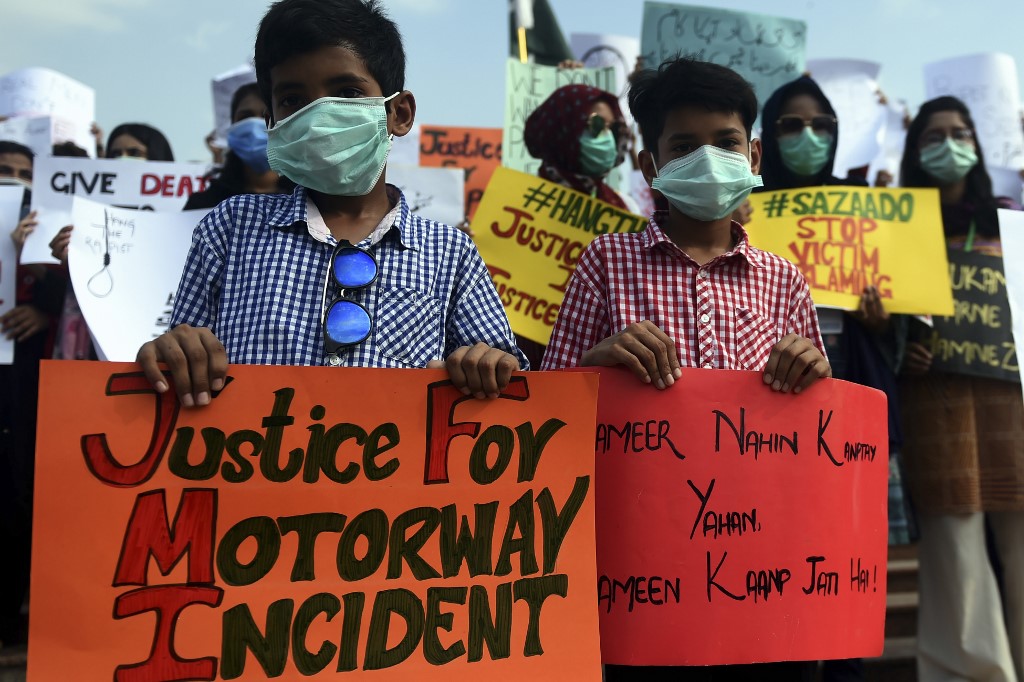LAHORE: It was 48 hours after a woman was gang-raped in front of her children last month that police made their first breakthrough in a case that has shocked and outraged the nation.
On September 11, authorities matched one of two sets of DNA evidence from the scene of the crime along a major Pakistani highway with a 27-year-old man called Abid Ali who had previously been charged with rape and sexual assault.
Therein began a manhunt that has continued to date, as rights activists and citizens have demanded that the Pakistani government do more to stem violence against women, including ensuring perpetrators are held accountable in a country that has seen at least 3,500 rapes this year, according to the group War Against Rape.
In the most recent incident, public outcry has at least kept pressure on authorities to solve the case.
Arab News contacted Senior Superintendent of Police Investigation Zeeshan Asghar, Deputy Inspector General Investigation Shehzad Sultan, and Fiza Mumtaz, a female police officer who is a member of the joint investigation team probing the case. Despite repeated texts and calls, the officers did not respond. Punjab Law Minister Raja Basharat could also not be reached after several calls.
The following account is based on interviews with two senior police officials in Punjab who are directly involved in the investigation. Both requested anonymity as they are not authorized to speak to the media about the case.

Members of VCare Welfare Trust hold placards during a protest in Karachi on Sept. 13, 2020, after a gruesome gang rape of a woman in front of her two children after her car ran out of fuel near the eastern city of Lahore late on Sept. 9. (AFP)
Last month, after police identified Ali as a suspect, they matched his identity card number to four cell phone numbers, and discovered that one had been switched on on the night of the attack and he had received text message notifications from his cellular company on it, one senior Punjab police official said. This one-way exchange allowed police to place him near the scene of the crime at the time the rape took place, the senior police official said.
Though Ali is still at large, his cellphone records then led police to a second suspect, Shafqat Ali, who was arrested on September 14.
Police trawled through Ali’s phone records for frequent callers and then widened the search to the call records of his family members to see if they were in touch with someone who could be placed near the motorway on the night of the rape.
“We finally got a phone number [of the second accused],” the senior police officer said. And though the phone was switched off when police called, they were able to determine that it was last used in Punjab province’s Okara district.
At this point, the chief of Punjab police said in a press conference that officials had identified a felon named Waqar ul Hassan as the second suspect in the case.
“We are 95-96% sure that this [Hassan] is the man because his phone was also in that location,” the top cop told reporters.
He was wrong. In fact, Shafqat Ali had been using a SIM registered under Hassan’s name, which led police to mistakenly believe Hassan was a suspect, a second officer involved in the investigation told Arab News.
“Waqar’s image was mistakenly being run in the media” as the accomplice, Nayab Haider, the spokesperson of the Punjab police, told Arab News over the phone, saying when police questioned Hassan, he revealed that a day laborer named Shafqat Ali had recently become a close associate of Abid Ali.
Police dugout Shafqat’s ID card but discovered that the picture on it was too old to be able to help identify him. So they turned to social media and found a Facebook account with more recent pictures of the suspect.
Teams were then quickly sent to comb through villages in Okara, where the phone number Shafqat was using was last switched on. Photographs of the suspect were shown to residents, asking for leads.
Finally, on September 14, six days after the gang-rape, the Counter-Terrorism Department found Shafqat hiding in a house in Okara. His DNA samples matched the samples found on the rape survivor’s clothes.
Police are still on the hunt for Ali, and say that in the last two weeks, they have come close to arresting him at least twice.
“It seems that he is hiding in one place and not getting out,” the police spokesperson said. “Since his picture is now viral, I don’t think anyone will give him refuge. People are really angry. So where can he escape to?”
















